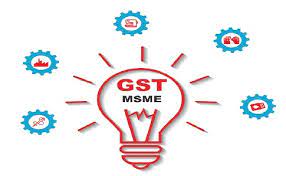![]()
Is GST Registration Mandatory for MSME?
Introduction
The Goods and Services Tax (GST) is a significant tax reform that has streamlined the taxation system in India. Micro, Small, and Medium Enterprises (MSMEs) form the backbone of the Indian economy, contributing significantly to employment and GDP. However, many MSME owners are often confused about whether GST registration is mandatory for them. .
Definition of GST and MSME
GST (Goods and Services Tax): GST is a unified indirect tax levied on the supply of goods and services across India. It replaces multiple taxes such as VAT, service tax, and excise duty.
MSME (Micro, Small, and Medium Enterprises): The classification of MSMEs is based on investment and turnover:
- Micro Enterprises: Investment up to Rs. 1 crore & turnover up to Rs. 5 crores.
- Small Enterprises: Investment up to Rs. 10 crores & turnover up to Rs. 50 crores.
- Medium Enterprises: Investment up to Rs. 50 crores & turnover up to Rs. 250 crores.
Is GST Registration Mandatory for MSMEs?
GST registration is mandatory for MSMEs in the following cases:
- If Annual Turnover Exceeds the Threshold Limit:
- Rs. 40 lakh for goods (Rs. 20 lakh for special category states).
- Rs. 20 lakh for services (Rs. 10 lakh for special category states).
- Inter-State Sales: If an MSME supplies goods or services across state borders.
- E-commerce Sellers: MSMEs selling through online platforms like Amazon, Flipkart, or their websites.
- Reverse Charge Mechanism (RCM): If the MSME is liable to pay GST under RCM.
- Voluntary Registration: Many MSMEs opt for voluntary registration to avail input tax credit and expand business opportunities.
However, GST registration is not mandatory if an MSME operates within a state and its turnover remains below the prescribed limit.
Benefits of GST Registration for MSMEs
- Legitimacy & Business Expansion: GST-registered businesses gain credibility and access to a larger market.
- Input Tax Credit (ITC): Registered businesses can claim ITC, reducing their overall tax burden.
- Ease of Doing Business: GST simplifies tax compliance, reducing paperwork and eliminating cascading taxes.
- Access to Government Tenders & Loans: Many government schemes and financial institutions require GST registration for loan approvals and tender applications.
- Seamless Inter-State Transactions: Registered MSMEs can sell across states without additional tax burdens.
- E-Commerce Participation: Enables businesses to sell via online platforms, increasing sales opportunities.
Limitations of GST for MSMEs
- Compliance Burden: Regular filing of GST returns can be complex and time-consuming.
- Increased Operational Costs: Hiring tax professionals for GST compliance adds to business expenses.
- Cash Flow Issues: MSMEs must pay GST on sales, even if they haven’t received payments from buyers.
- Technical Challenges: Many small business owners face difficulties in understanding and implementing GST procedures.
- Penalty for Non-Compliance: Heavy fines and penalties for late filing or incorrect returns.
Application Process for GST Registration
Steps to Register for GST
- Visit GST Portal: Go to www.gst.gov.in.
- Fill Application (GST REG-01): Enter business details, PAN, mobile number, and email.
- Verify with OTP: Validate information through OTP sent to registered mobile and email.
- Submit Business Documents:
- PAN Card and Aadhaar Card.
- Business registration proof.
- Bank account details.
- Address proof.
- Receive GSTIN: Once verified, a GST Identification Number (GSTIN) is issued.
- Start Filing Returns: MSMEs must regularly file GST returns as per their category.
Comparative Table: GST Mandatory vs. Non-Mandatory MSMEs
| Criteria | Mandatory GST Registration | Non-Mandatory GST Registration |
|---|---|---|
| Annual Turnover | Above Rs. 40L (Goods) / Rs. 20L (Services) | Below threshold limit |
| Inter-State Sales | Required | Not Required |
| Input Tax Credit (ITC) | Available | Not Available |
| E-Commerce Selling | Required | Not Allowed |
| Compliance Burden | High | Low |
| Access to Loans/Tenders | Easier | Limited |
| Return Filing | Monthly/Quarterly | Not Required |
Conclusion
GST registration is essential for MSMEs exceeding the turnover threshold, engaging in inter-state trade, or selling online. While it offers benefits like ITC and business expansion, the compliance requirements can be challenging. MSMEs should assess their business model, turnover, and future growth before deciding on GST registration.
Frequently Asked Questions (FAQs)
1. Is GST registration compulsory for all MSMEs?
No, it is only mandatory if they exceed the turnover limit or fall under specific categories.
2. Can an MSME voluntarily register for GST?
Yes, businesses can register voluntarily to avail benefits like ITC and e-commerce sales.
3. What happens if an MSME does not register for GST?
If required to register but fails, penalties and legal actions may follow.
4. How long does GST registration take?
Generally, it takes 7-10 working days after document submission.
5. Can an MSME operate without GST?
Yes, if turnover is below the threshold and it does not engage in interstate sales.
6. What are the penalties for not registering under GST?
Penalties include a 10% fine (minimum Rs. 10,000) or 100% of the tax due.
7. Does GST apply to service-based MSMEs?
Yes, if turnover exceeds Rs. 20 lakh (Rs. 10 lakh in special category states).
8. How often do MSMEs need to file GST returns?
Monthly or quarterly, depending on turnover and scheme.
9. Can a GST-registered MSME cancel its registration?
Yes, if it no longer meets the criteria, it can apply for cancellation.
10. Does GST impact MSME profitability?
It can increase compliance costs but also offers tax benefits that enhance profitability.
To Visit https://www.gst.gov.in/
Contact:ô ô ô ô 8130555124, 8130045124
Whatsapp:ô ô https://wa.me/918130555124
Mail ID:ô ô ô ô ô ô operations@vibrantfinserv.com
FB Link:ô ô ô ô ô ô https://fb.me/vibrantfinserv
Insta Link:ô ô https://www.instagram.com/vibrantfinserv2/
Twitter:ô ô ô ô ô ô https://twitter.com/VibrantFinserv

For further details access our website https://vibrantfinserv.com/